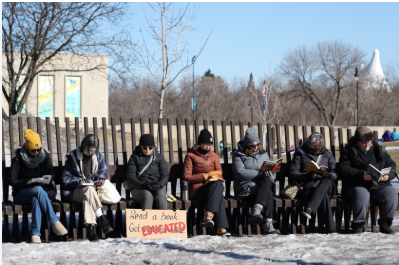COVID-19 continues to impact Fargo North community
Rising cases lead to increased student & teacher absences
Have you noticed the school has felt a little more empty than usual on your alphabet day? Are other teachers subbing for your teacher, or is your teacher having to Zoom into class every day because they are quarantined and/or have the virus? I’m pretty sure the majority of North students can answer yes to these questions, especially since November, more and more students and teachers have been out of school due to the pandemic. Many teachers have had many students out, with one teacher having a total of 18 kids out for COVID related reasons on Nov. 9, 2020. It is difficult for both teachers and students when students are absent.
“Having a ton of kiddos out has not been ideal,” said English teacher Morgan Miller, who was quarantined for the second half of November, due to being a close contact.
Just within the first two weeks of November (Nov. 2-13), there were an estimated 100 students out for Covid reasons. Many staff members are also out for Covid reasons, causing other staff members to sub during their prep periods and bring work home with them after the long school day.
“I am not required to sub during prep periods. I am conflicted on subbing, because all teachers need their preparation time, but I also don’t want to leave another teacher hanging without a substitute,” said math teacher Keith Lehman, who subbed for 7 periods during the week of Nov. 16-19.
Especially with this school year, teachers having time to prepare during their work day is very important, as they are making two lesson plans a day for their in-person and at-home students. Compared to students who take longer lunch breaks, leave school earlier, or sleep in on their off periods, teachers have lots more to do during their off time.
“Prep periods are important to plan for upcoming lessons, contact students who have been out of school, grade papers, meet with students to review material, write assessments, contact parents, meet with counselors, attend IEP meetings, and anything else that comes with teaching,” said Lehman.
On the flip side, students who have tested positive or quarantined due to being a close contact have also had lots of work to do. Junior Ellie Gillen has been quarantined three times so far this year due to close contacts. Her first quarantine was the first two weeks of school, then Oct. 20 for 14 days plus a weekend, and her most recent one was Nov. 12-23. Overall, Gillen enjoyed the opportunity quarantine gave her to become “an expert on isolation,” but she did not appreciate the amount of homework.
“I tried my best to keep up [with the homework], but along with the stress of quarantine, my little brother being high risk, and my two AP classes with zero open periods, I started drowning real quick,” Gillen said.
There are many other students at North who have struggled getting through at least one quarantine period, most cannot even fathom what three quarantine cycles would feel like within three months.
“It was a lot to handle,” Gillen said.
Other students have been much luckier with their symptoms and ability to keep up with work. Senior Grace DeJong tested positive for COVID-19 on Nov. 17, and was able to return to school the following Monday. She was worried about receiving a ton of homework over her quarantine period, but it was more manageable than expected.
“My experience wasn’t bad at all; I didn’t miss as much as I’d thought,” said DeJong.
Overall, this pandemic has not been ideal for students and teachers, who both are constantly in and out of quarantines. Just like the virus, each person has their unique situation when it comes to their quarantine time and workload. It’s stressful on both the teachers who are waiting on assignments from students, as well as on the student side when their workload feels impossible to finish. An excellent way to keep yourself and others around you from getting quarantined and missing out on valuable school time is to simply wear your masks and keep yourself at least six feet away from others. If you do those two things, you shouldn’t be counted as a close contact and can continue to help keep schools up and running.
Your donation will support the student journalists of Fargo North High School. Your contribution will allow us to resume physical printing of our newspaper for students at Fargo North!

Kim Kadrmas is a senior and Editor-in-Chief for The Scroll. She is involved in many activities such as JCL, Band, and Key Club. In her free time she enjoys...



